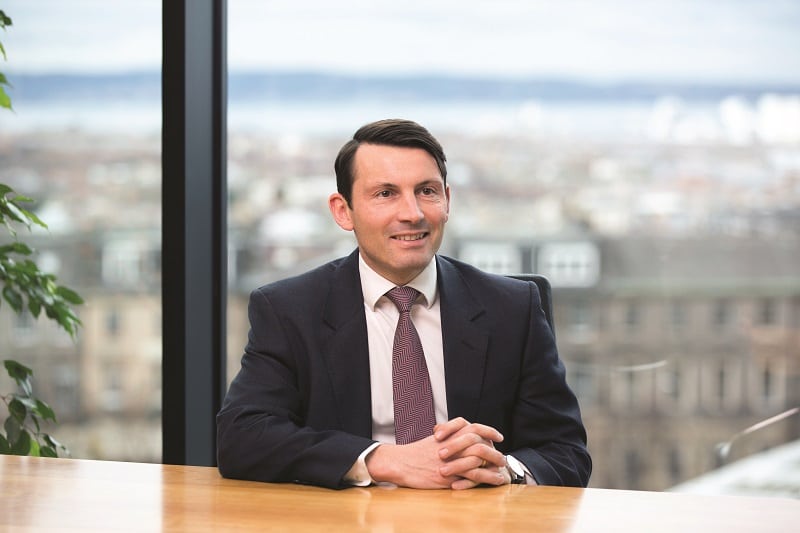Scottish Mortgage has wiped 16% off its market cap as Baillie Gifford investment trusts dominate the worst-performing closed-ended funds during this month’s market sell-off, according to Stifel research.
The £7.3bn Scottish Mortgage trust, lead managed by James Anderson with Tom Slater (pictured) as deputy, has been the fourth-worst performer over the first 11 days of the month. Total assets in the trust were £8.6bn, according to its latest factsheet for the period ended 31 August.
It is joined by the £495.5m Edinburgh Worldwide, which is also in the Global investment trust sector, and the £239.3m US Growth trust, which was launched in March, among the 10 trusts with the largest share price falls over the period.
Investment trusts with exposure to technology, China and other Asian markets have been the largest fallers in the sell-off, Stifel noted. Technology shares led Wednesday’s sell-off in the US as the S&P 500 tumbled 3.29%, its steepest one-day fall since February. Stock market indices around the globe, including the FTSE, followed suit.
Investment trusts hit by October sell-off
| Fund | Change in price |
| Pacific Horizon | -19% |
| Edinburgh Worldwide | -18.90% |
| Allianz Technology Trust | -17.30% |
| Scottish Mortgage | -16% |
| JPMorgan Chinese | -16% |
| International Biotechnology | -15.70% |
| Biotech Growth Trust | -15.20% |
| Baillie Gifford US Growth | -14.10% |
| BB Healthcare | -14.10% |
| Fidelity China Special Situations | -13.90% |
Source: Datastream/Stifel/Data for the period 1 October 2018 to 11 October 2018
AJ Bell investment director Russ Mould said the trusts are invested in high-octane areas of the market with valuations that are likely to come under pressure when markets shift from risk-on to risk-off. “They’re higher risk areas because there are profits to be taken and people might be inclined to take them,” Mould said.
Stifel highlighted that Scottish Mortgage has a highly concentrated portfolio with 52% of its net asset value in its top-10 holdings. Amazon accounts for 10.8% of the portfolio, while Alibaba, Tencent, Tesla, Baidu and Netflix are also in the top 10. The investment trust increased its gearing in June, which Mould said would have accentuated falls in the sell-off. At 9%, it the most heavily geared Baillie Gifford trust from the sell-off followed by Edinburgh Worldwide, which has 3%.
Pacific Horizon biggest loser in sell-off
However, it was Baillie Gifford’s Asia-Pacific ex-Japan investment trust Pacific Horizon that has suffered the worst fall in October, losing 19% over the first 11 days of the month.
“The Asian baby has been thrown out with the Turkish and Argentinian bathwater,” Mould said. “In most cases the Asian economies have taken on lessons of 1997/98. If there is an issue to be addressed it’s more at the corporate borrowing level rather than government borrowing level. That’s something to keep an eye on.”
Mould said “as a value kind of guy” he considered Pacific Horizon a buying opportunity over the other Baillie Gifford investment trusts that had fallen over the period. “We know value has been out of fashion for what feels like forever; at some stage you’d expect momentum to have its time in the doghouse. Rising bond yields, rising interest rates is one of the environments where you’d expect that,” he said.
Alongside Edinburgh Worldwide and the UK Growth trust, Pacific Horizon is now trading at a discount.
In June, the UK Growth trust, which Baillie Gifford took over from Schroders, was the only trust in the Scottish asset manager’s stable trading at a discount. It is currently trading at a 9.8% discount, while Pacific Horizon and Edinburgh Worldwide have discounts of 6.7% and 1.3% respectively, according to the Association of Investment Companies.
Watch tech for ominous signs of wider market trouble
Mould expected it would take more than one wobble for the risk-off narrative to take hold for markets. “Nothing really fundamentally has changed except for bond yields have gone up.”
However, tech would be the sector to watch for signs of trouble, he said.
“If leadership is lost by the sector that has taken us up that is potentially quite an ominous sign for the wider market. Tech took us up in ’98 to 2000, banks and financials took us up in 2005 to ’07 and once they started to lose momentum and lost leadership then that was not a great sign for the wider market.”











